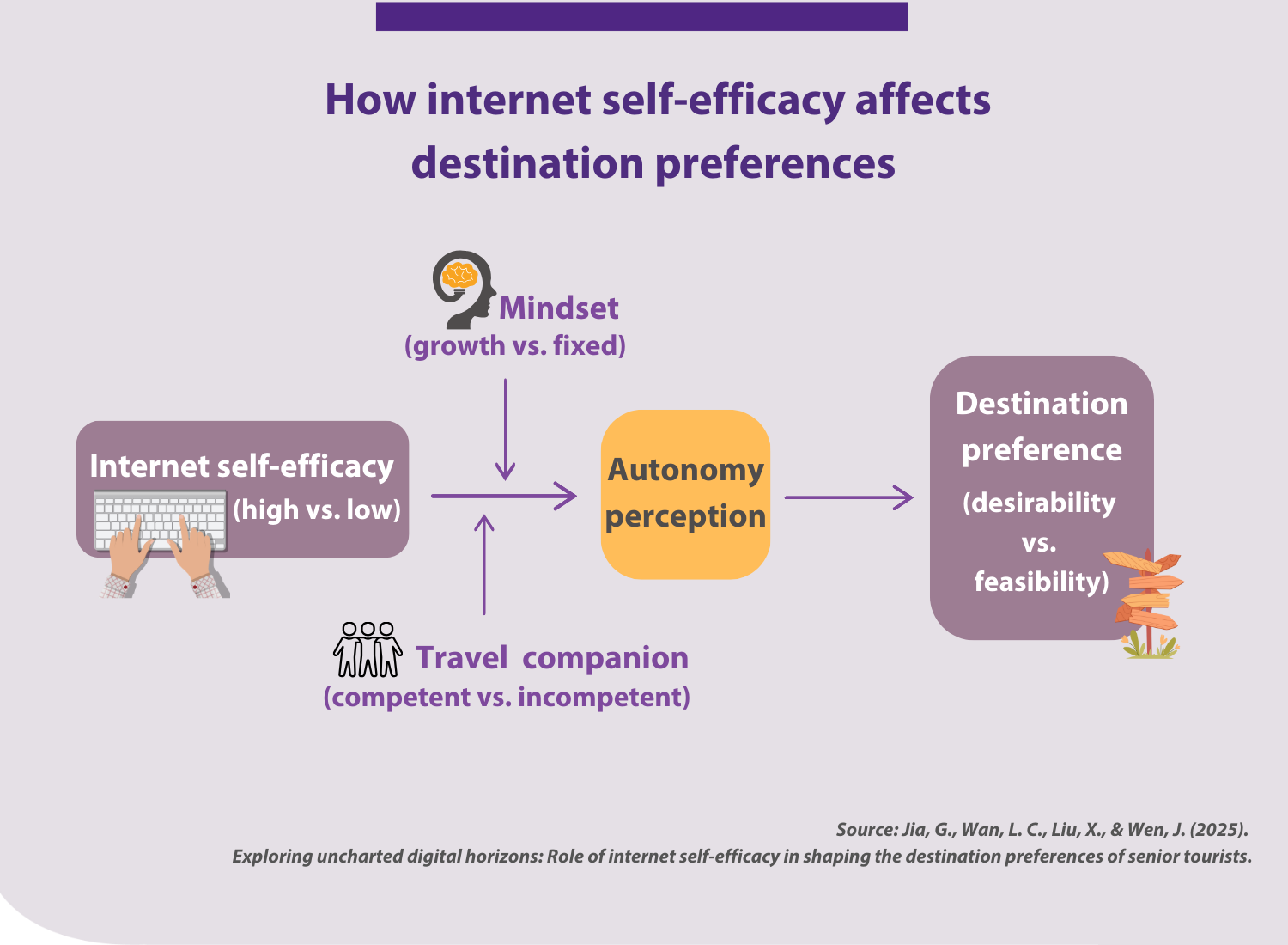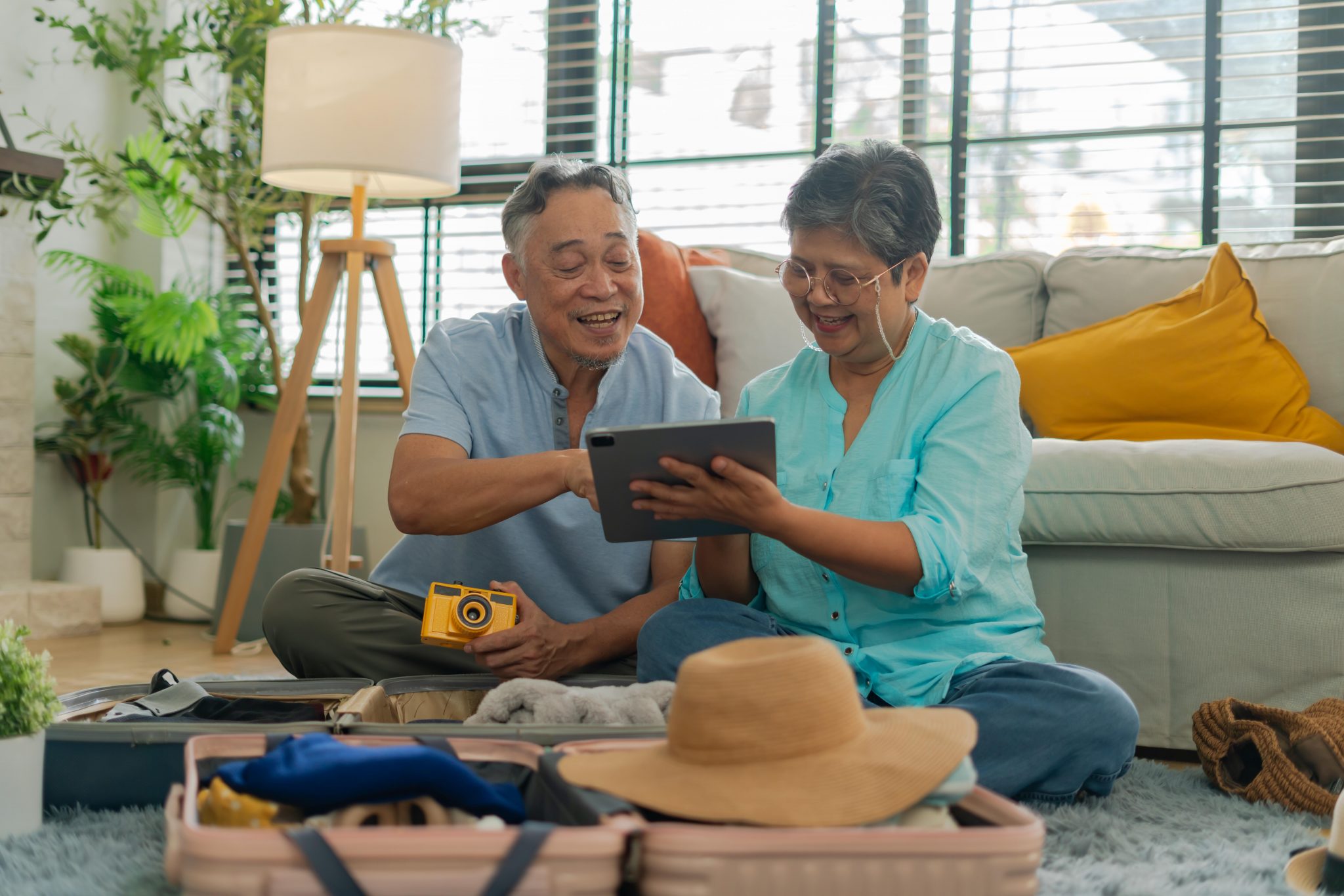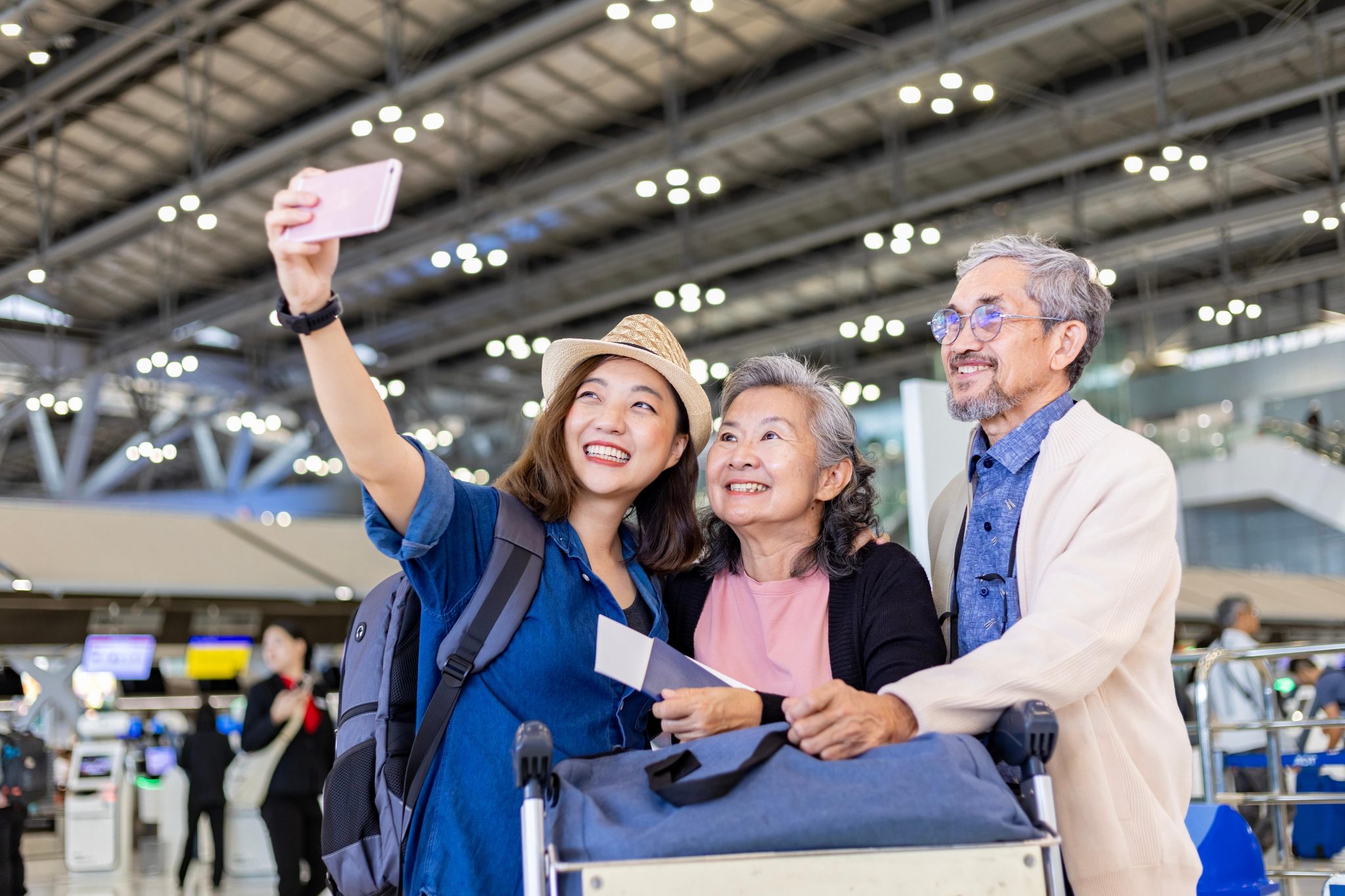Featured Faculty

Wan, Lisa Chun-ying
Associate Professor
Co-Director, Centre for Hospitality and Real Estate Research
Outstanding Fellow of the Faculty of Business Administration
More in Consumer Behaviour, Marketing ...
Will lack of internet skills prevent seniors from travelling?
• 6 mins read
Guess which destination is more appealing for senior tourists: charming scenery and delicious cuisine or easy access and age-friendly services? The answer depends on their surfing skills
Young faces often take the spotlight in discussions about tourism, yet senior tourists, with their discretionary savings and spare time, possess significant resources and chances to travel. Alas, there remains a limited understanding of their decision-making process in the digital age.
Given that internet usage is increasingly pivotal to fulfilling informational needs, Lisa Wan, Associate Professor of the School of Hotel and Tourism Management and Department of Marketing at the Chinese University of Hong Kong (CUHK) Business School, delves into the impact of senior tourists’ internet literacy on their preferences for travel destinations.
“The world is rapidly advancing technologically and witnessing a significant demographic shift towards an ageing population, but we discovered that limited internet abilities among seniors act as limiters rather than complete barriers,” Professor Wan says.
“Our findings demonstrate that a lack of internet abilities does not necessarily prevent seniors from travelling, but encourages them to adopt alternative travel approaches that are deemed more feasible for them.”
Professor Lisa Wan
In a study titled Exploring uncharted digital horizons: Role of internet self-efficacy in shaping the destination preferences of senior tourists, Professor Wan and Jia Guangmei, Liu Xin and Wen Ji of Jinan University in China, also explore how marketers should target elderly tourists strategically in the era of technology.
Desirability vs. feasibility

Professor Wan notes that tourists often rely on the internet to solve problems when encountering unfamiliar environments, suggesting a strong correlation between tourists’ decision-making processes and their internet self-efficacy levels. Internet self-efficacy, representing one’s confidence in effectively performing internet-related tasks, stands as a critical factor that can change an individual’s decisions and behaviour.
Therefore, the researchers posited that senior tourists with high internet self-efficacy are more likely to choose desirable or attractive destinations, while those with low internet self-efficacy focus more on the feasibility or accessibility of tourist spots. Desirable destinations include charming scenery, abundant food choices, and a pleasant climate. Feasibility, on the other hand, typically pertains to factors such as convenient transportation and ample age-friendly services.
In addition, the researchers argued that mindsets and travel companions could influence the effect of internet self-efficacy on their destination preferences among seniors.
The role of internet self-efficacy
The team conducted a series of experiments in China to test their hypotheses, recruiting participants from online platforms and in person. They categorised senior travellers as individuals aged 55 years and above, aligning with the average retirement age in China.
The first experiment consisted of two parts: a field experiment and a scenario-based trial. In the field experiment, participants were presented with a choice between two portable nightlights for travel. Nightlight A is easy to learn but has fewer functions, while nightlight B is hard to learn but has multiple functions.
The results confirmed that seniors who are less confident in their internet skills chose nightlife A for its feasibility, while seniors with high internet self-efficacy were keen to use nightlight B that represents desirability.
In the scenario-based experiment, participants were asked to imagine going on vacation and determine whether they would choose a highly attractive yet less practical destination. Similar to previous results, senior participants with high internet self-efficacy demonstrated a greater inclination towards desirability.
“This preference may arise because high internet self-efficacy instils a sense of autonomy, the extent to which individuals have control over their travel actions and experiences,” Professor Wan explains.

Be open-minded or choose a competent companion
The researchers further explored how seniors’ mindsets and travel companions impact their decision-making. People with a fixed mindset perceive human traits as predetermined and stable, whereas those with a growth mindset see human traits as flexible and subject to significant transformation through diligent effort.
“Individuals holding a growth mindset tend to be open-minded when facing obstacles, but those holding a fixed mindset are inclined to exhibit avoidance behaviours,” says Professor Wan.
In a subsequent experiment, participants were asked to read articles designed to manipulate their mindset before selecting travel destinations. One article emphasised that an individual’s character is amendable, and another stated the opposite. The result showed that seniors with strong internet skills in a fixed mindset prefer destinations with high desirability, while those with weaker skills opt for high-feasibility ones. Conversely, senior tourists with a growth mindset tend to prioritise desirable destinations regardless of their internet proficiency.
Lastly, the researchers examined the role of travel companions. Participants were asked to imagine travelling with a friend and chose destinations as in previous experiments. The results showed that senior tourists prefer destinations with higher desirability when travelling with a tech-savvy companion, regardless of their own internet self-efficacy. However, if travel companions are incompetent, seniors with low internet self-efficacy are more inclined to visit high-feasibility places.

This finding aligns with the self-expansion theory, which suggests individuals can broaden their sense of self by engaging in relationships with others who offer resources. “Competent companions with advanced abilities and skills can be perceived as complementary to senior travellers’ own abilities, helping them overcome their personal deficiencies,” says Professor Wan.
Tailored marketing strategies for distinct groups
This research not only demonstrates senior tourists as rational decision-makers who plan ahead before making choices, but also challenges the common assumption of older adults lacking proficiency in technology.
“As senior tourists still have a strong desire to participate in travel experiences, it is crucial for marketers to acknowledge the potential of this demographic in the digital world and tailor product marketing strategies to effectively meet their unique needs and preferences,” Professor Wan says.
For senior tourists with adept internet capabilities, marketers should highlight desirable features, such as scenic beauty and diverse food options. When targeting seniors with limited digital proficiency, accentuating practical aspects like accessibility and transportation convenience would work best.
Diverse marketing channels should be employed to reach both groups, as tech-savvy seniors may use social media networks, travel forums, and websites frequently, while traditional marketing tools such as billboards and brochures are more effective in targeting seniors with low internet abilities.
Travel planning, especially for self-organised trips, is highly dependent on internet searches nowadays. Despite technological advancements posing challenges, this research emphasises that internet abilities may serve as limiters rather than prohibitors for some senior tourists.
“Our findings demonstrate that a lack of internet abilities does not necessarily prevent seniors from travelling, but encourages them to adopt alternative travel approaches that are deemed more feasible for them,” Professor Wan says.






